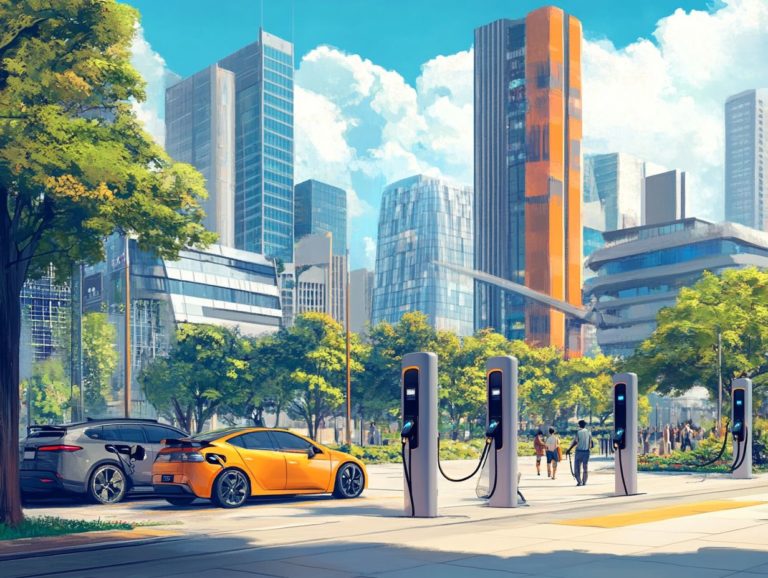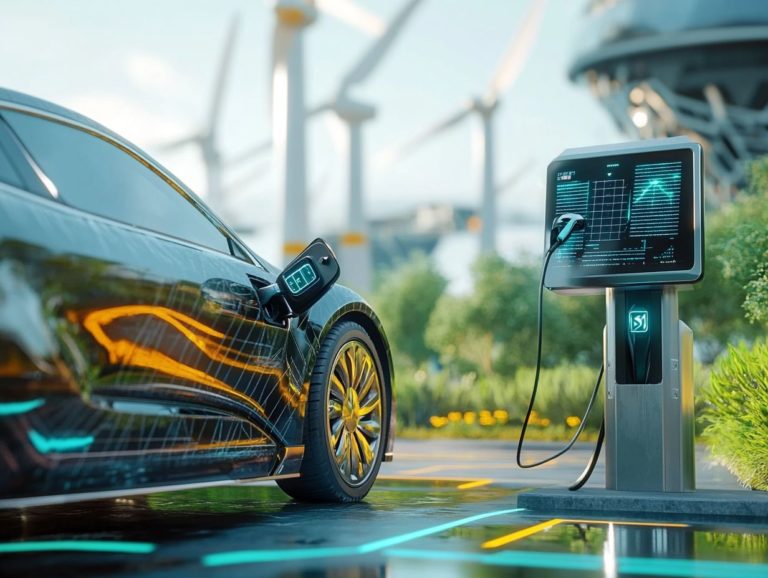5 Essential Facts About Electric Vehicle Maintenance
As electric vehicles (EVs) grow in popularity, understanding their unique maintenance requirements is essential for you as an owner.
Although these eco-friendly vehicles have fewer moving parts compared to traditional gasoline cars, regular upkeep remains vital to ensure they perform at their best and last longer.
Get ready to discover five must-know facts about maintaining your electric vehicle!
Act now to ensure your electric vehicle operates smoothly and efficiently for years ahead!
Contents
- Key Takeaways:
- 1. Electric Vehicles Have Fewer Moving Parts
- 2. Regular Maintenance Is Still Necessary
- 3. Battery Maintenance Is Key
- 4. Maintenance Costs Can Vary
- 5. Maintenance Requirements May Differ from Gasoline Vehicles
- What Are the Most Common Maintenance Tasks for Electric Vehicles?
- Frequently Asked Questions
- What is an electric vehicle?
- What are the main maintenance differences between an electric vehicle and a gas-powered vehicle?
- How often do electric vehicles need to be serviced?
- Are there any special maintenance tasks for electric vehicles?
- Can I do maintenance on my electric vehicle myself?
- How do I find a reliable mechanic for my electric vehicle?
Key Takeaways:
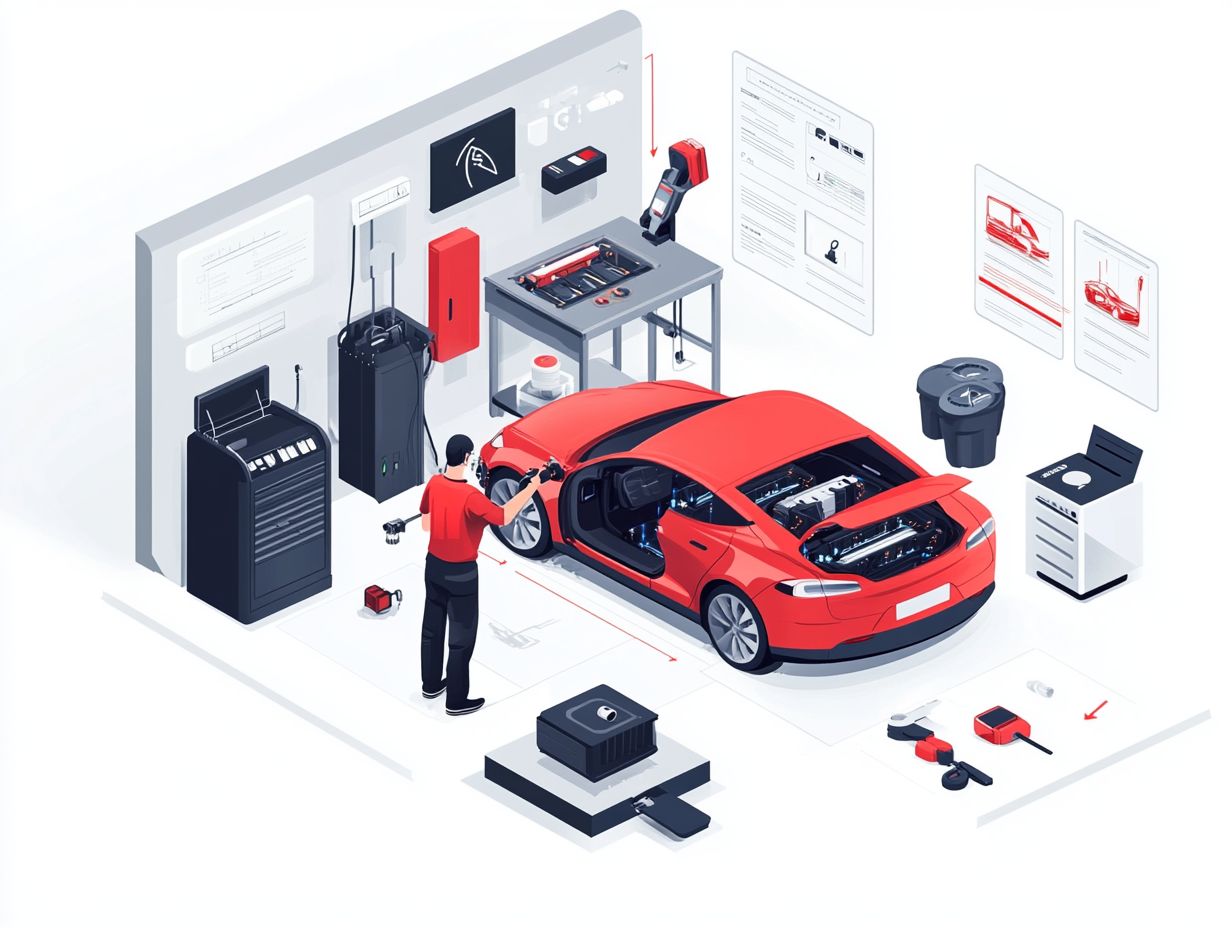
- Electric vehicles have fewer moving parts, reducing the need for frequent maintenance and potential breakdowns.
- Regular maintenance is still necessary for electric vehicles, such as tire rotations and brake inspections.
- Battery maintenance is key for the longevity of an electric vehicle, including proper charging and temperature control.
1. Electric Vehicles Have Fewer Moving Parts
Electric vehicles (EVs) represent a revolutionary shift in the automotive industry. Their design features significantly fewer moving parts compared to traditional gasoline and diesel cars. This results in enhanced energy efficiency and reduced maintenance complexities for you and other consumers in the United States and beyond.
This streamlined mechanical design lowers the likelihood of mechanical failures and reduces the number of components needing manufacturing, ultimately lessening the overall carbon footprint associated with production.
As the market trends toward increased adoption of battery electric vehicles, the implications for manufacturing jobs evolve dramatically. The demand for skilled technicians and engineers specializing in clean technology is on the rise, while traditional manufacturing roles may decline.
Advancements in battery technology also enhance the benefits of EVs by offering better energy storage solutions and longer ranges. These developments herald a vital transition toward a more sustainable future, where the automotive sector plays a significant role in reducing greenhouse gas emissions and fostering a cleaner environment for all.
2. Regular Maintenance Is Still Necessary
Despite having fewer moving parts, regular maintenance for electric vehicles is crucial for ensuring optimal performance and longevity. Understanding EV maintenance myths can help address various consumer economics factors and enhance your user experience, especially with the expanding EV charger network.
Unlike traditional vehicles, which mainly require oil changes and engine checks, electric vehicles rely heavily on software updates to boost efficiency and improve safety features. While tire rotations are common for both car types, EVs also benefit from periodic checks on battery health and coolant systems.
Understanding these specific maintenance needs can significantly shape your perception of electric vehicles compared to traditional options. For instance, knowing the 5 ways to keep your EV running smoothly ultimately influences your purchasing decisions. As you become more informed about these aspects, your confidence in the EV market will grow, paving the way for wider adoption.
3. Battery Maintenance Is Key
Battery maintenance is a critical aspect of your EV ownership, directly influencing both the lifespan and performance of your electric vehicle. Given the fluctuations in the prices of lithium, along with the need for sustainable sourcing of battery minerals, this becomes even more significant.
By adopting proper care routines, you not only extend the longevity of your battery systems but also enhance overall efficiency. Attention to detail is essential for you as an owner. Regularly monitoring charge cycles how many times your battery can be charged and discharged avoiding extreme temperatures, and keeping your battery at optimal charge levels meaning not letting it get too full or too empty are all vital practices to incorporate into your routine.
Rising lithium prices can impact consumer choices, potentially steering you toward more affordable alternatives. This situation underscores the importance of a robust domestic supply chain for sourcing essential battery minerals. In a rapidly evolving market, understanding these dynamics gives you the power to make informed decisions about your electric vehicle investments.
4. Maintenance Costs Can Vary
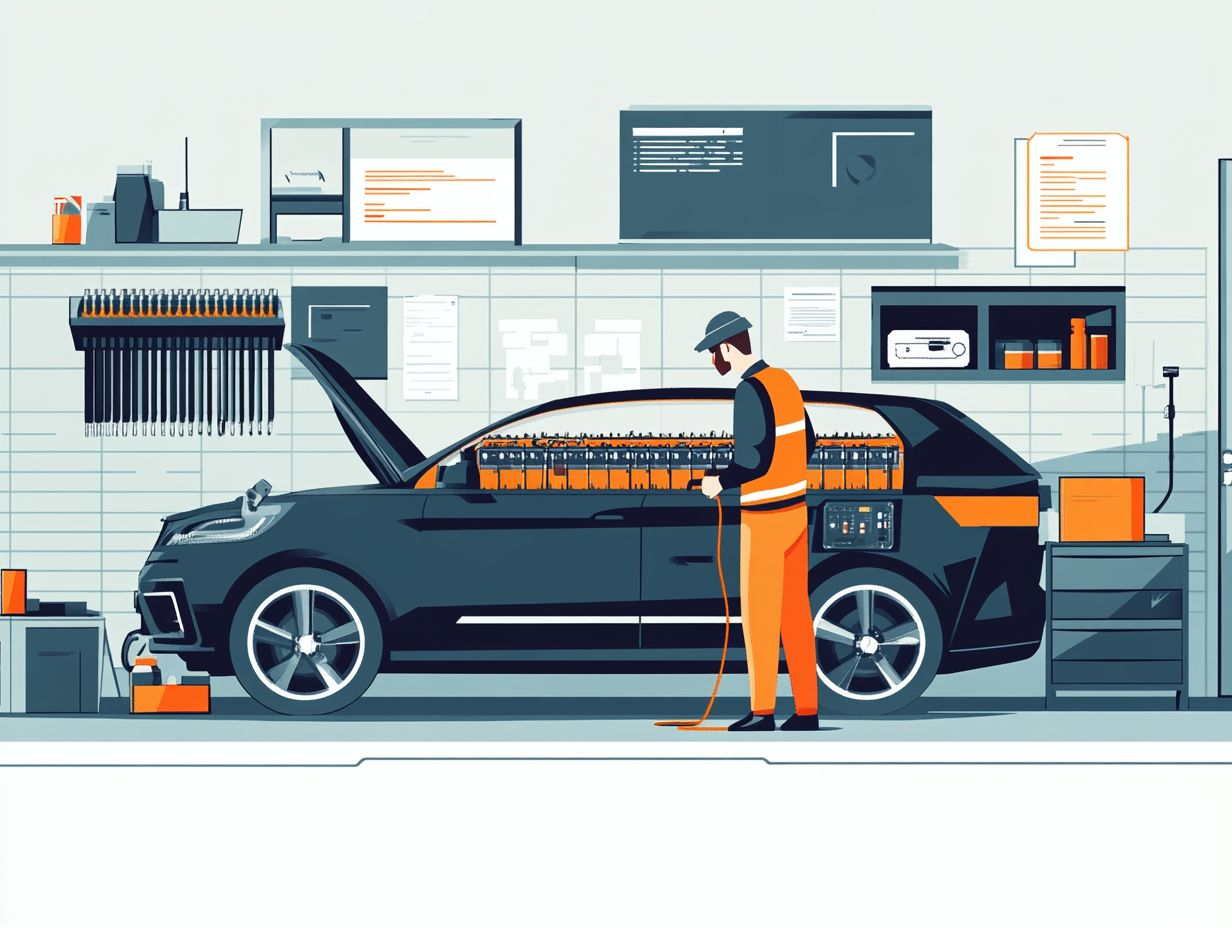
Maintenance costs for electric vehicles can vary widely. Factors like the model you choose, how you use it, and the availability of local services will influence these costs.
Understanding EV maintenance involves aspects like battery health inspections, software updates, and tire rotations. For more detailed information, you can explore the maintenance needs of EVs, as each may differ in frequency and cost compared to traditional gasoline-powered vehicles.
While you save on oil changes and fuel system repairs, consider expenses for specialized parts like the battery or electric motor. These can be pricier than conventional components.
Evaluating these ongoing expenses helps you make informed decisions about your transportation investments. This ensures your transition to electric vehicles aligns with your budgetary expectations.
5. Maintenance Requirements May Differ from Gasoline Vehicles
The maintenance needs for electric vehicles differ significantly from those of traditional gasoline and diesel cars. Understanding the 5 things every EV buyer should know requires a shift in mindset as the EV transition gains momentum.
Electric vehicles lack complex internal combustion engines, removing the need for routine oil changes. This also reduces the number of moving parts needing regular service.
Unlike gasoline vehicles, which rely on intricate fuel systems and components prone to wear, electric vehicles have simpler mechanical systems. This simplicity leads to less frequent maintenance and lower costs.
You can expect to spend less time in the garage and more time enjoying a quiet, emission-free driving experience. This reduced maintenance burden makes budgeting simpler and leads to predictable ownership expenses.
What Are the Most Common Maintenance Tasks for Electric Vehicles?
The most common maintenance tasks for electric vehicles include essential checks to keep your ride running smoothly. Key tasks involve assessing battery performance, inspecting the EV charger network, and ensuring components like brakes and tires are in good condition. For more insights, consider these DIY maintenance tips for electric vehicles.
It s also wise to monitor the cooling system and update software regularly. These elements are key to maintaining your vehicle s efficiency and performance.
Regular battery performance checks help you spot issues early, ensuring your vehicle operates at peak capacity and extending its lifespan. Frequent assessments of your charging infrastructure ensure convenience, especially for long journeys.
Don’t overlook brake and tire inspections; they are vital for safety and impact handling and stopping performance. Keeping your software up to date allows you to enjoy the latest technological enhancements and safety features.
How Often Should Electric Vehicles Be Serviced?
Generally, you should service your electric vehicle every 8,000 to 12,000 miles. However, this can change based on your driving habits and manufacturer recommendations.
Factors like climate, terrain, and driving frequency can influence these service intervals. For example, living in a hilly area or navigating stop-and-go traffic may require more frequent checks.
Some manufacturers suggest more regular maintenance for models with advanced battery systems or unique features needing closer attention. To stay informed, check out 5 things you didn’t know about electric cars and follow local guidelines and industry practices to maintain your electric vehicle effectively.
This diligence not only prolongs its lifespan but also enhances your overall driving experience.
What Are the Signs That an Electric Vehicle Needs Maintenance?
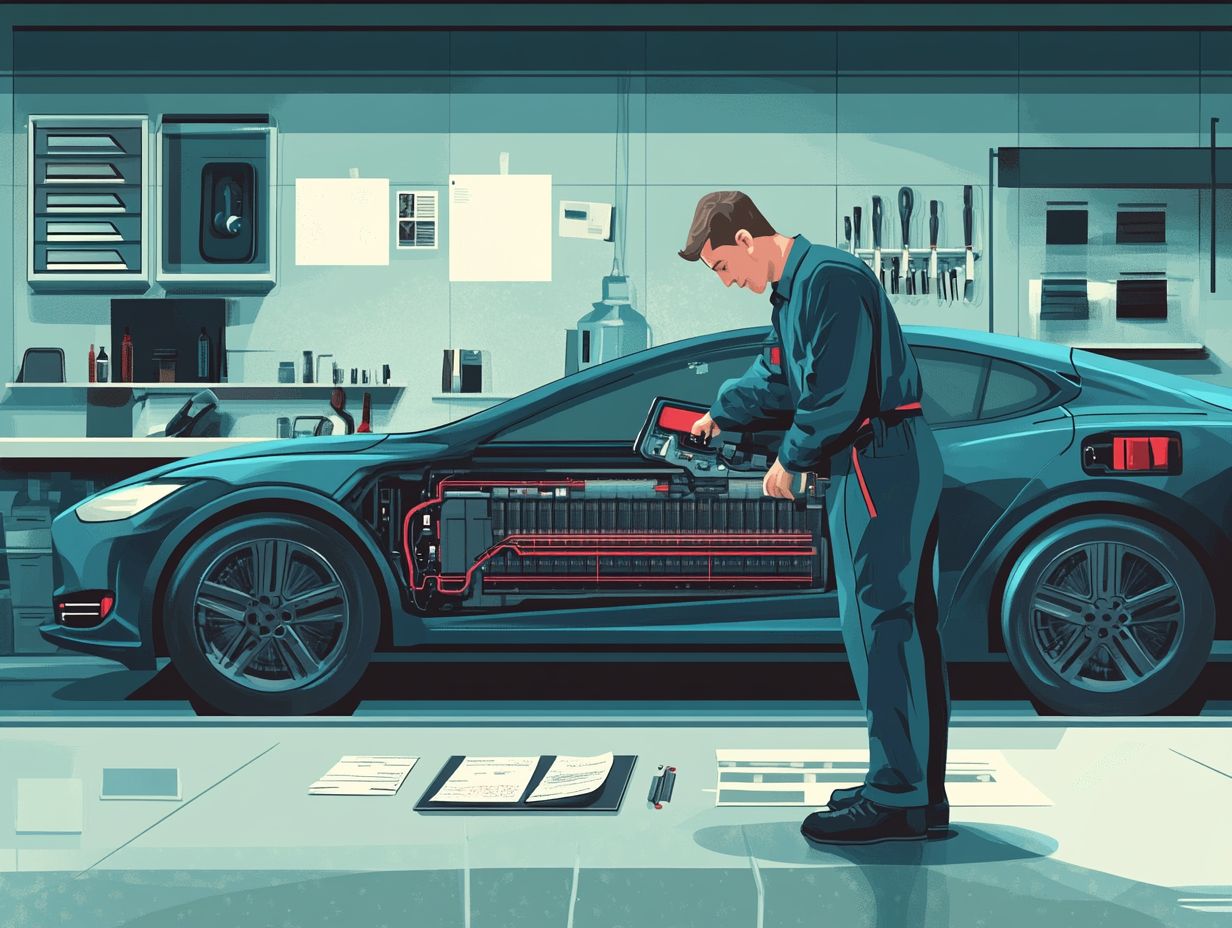
Common signs that your electric vehicle may need maintenance include decreased battery performance, unusual noises, warning lights on the dashboard, and reduced efficiency. These indicators are crucial for ensuring both the longevity and safety of your vehicle.
By recognizing these signs early, you can take proactive measures to tackle potential issues before they escalate. For example, if you notice a significant drop in range, it could signal that the battery needs adjustment or even replacement. If you hear strange sounds, it might point to equipment issues that require your immediate attention. Dashboard alerts often provide valuable insights into the health of your vehicle s systems and keep you informed about necessary check-ups.
Staying vigilant about these indicators not only extends the life of your vehicle but also enhances your overall driving experience, ultimately boosting your confidence on your electric journeys!
Can Electric Vehicle Maintenance Be Done at Home?
You ll find that many basic maintenance tasks for electric vehicles like tire rotations, cleaning, and checking fluid levels can easily be tackled at home. This gives you the power to take an active role in your vehicle’s upkeep while making the most of the EV charger network.
Engaging in these tasks enhances the longevity of your vehicle and helps you develop a deeper understanding of its performance needs. Regular checks you should consider include:
- Inspecting the brakes
- Ensuring the windshield wipers function correctly
- Monitoring battery health
Employing simple tips, such as wearing protective gear and maintaining a well-ventilated area during maintenance, can significantly enhance your safety while you tackle these chores. For complex tasks, seek professional help to ensure safety and precision.
How Can Proper Maintenance Extend the Life of an Electric Vehicle?
Proper maintenance is essential for extending the life of your electric vehicle. Implementing essential maintenance for used electric vehicles through regular checks and timely repairs can prevent costly issues and ensure that your vehicle operates at peak performance for years to come.
Consistently monitoring the health of your battery can significantly impact overall efficiency and range, allowing you to maximize your driving experience.
Performing routine inspections of your vehicle s braking system and tire pressure is equally important. These tasks enhance your safety and promote smoother operation and battery efficiency.
Keeping your software updated ensures that your vehicle benefits from the latest improvements and features, further optimizing its performance.
By adopting these proactive measures, you can enjoy a reliable ride that maintains both value and functionality well into the future!
What Are the Benefits of Regular Electric Vehicle Maintenance?
Regular electric vehicle maintenance offers numerous advantages, including enhanced safety, improved performance, and increased resale value. This ultimately ensures a smooth and reliable driving experience.
Routine upkeep not only extends your vehicle’s lifespan but also plays a pivotal role in your financial well-being. It helps minimize unexpected repair costs and optimizes energy efficiency, keeping your expenses in check. By committing to consistent checks and services, you can maximize your electric vehicle s battery life and overall productivity, leading to lower electricity bills and a smaller carbon footprint.
A well-maintained electric vehicle is far more likely to hold its market value, making it a savvy investment for both current and future owners. In this light, regular maintenance is not just a task; it becomes an essential aspect of owning an electric vehicle. To ensure you’re on the right track, check out these essential resources for EV maintenance, offering benefits for both you and the environment.
Frequently Asked Questions
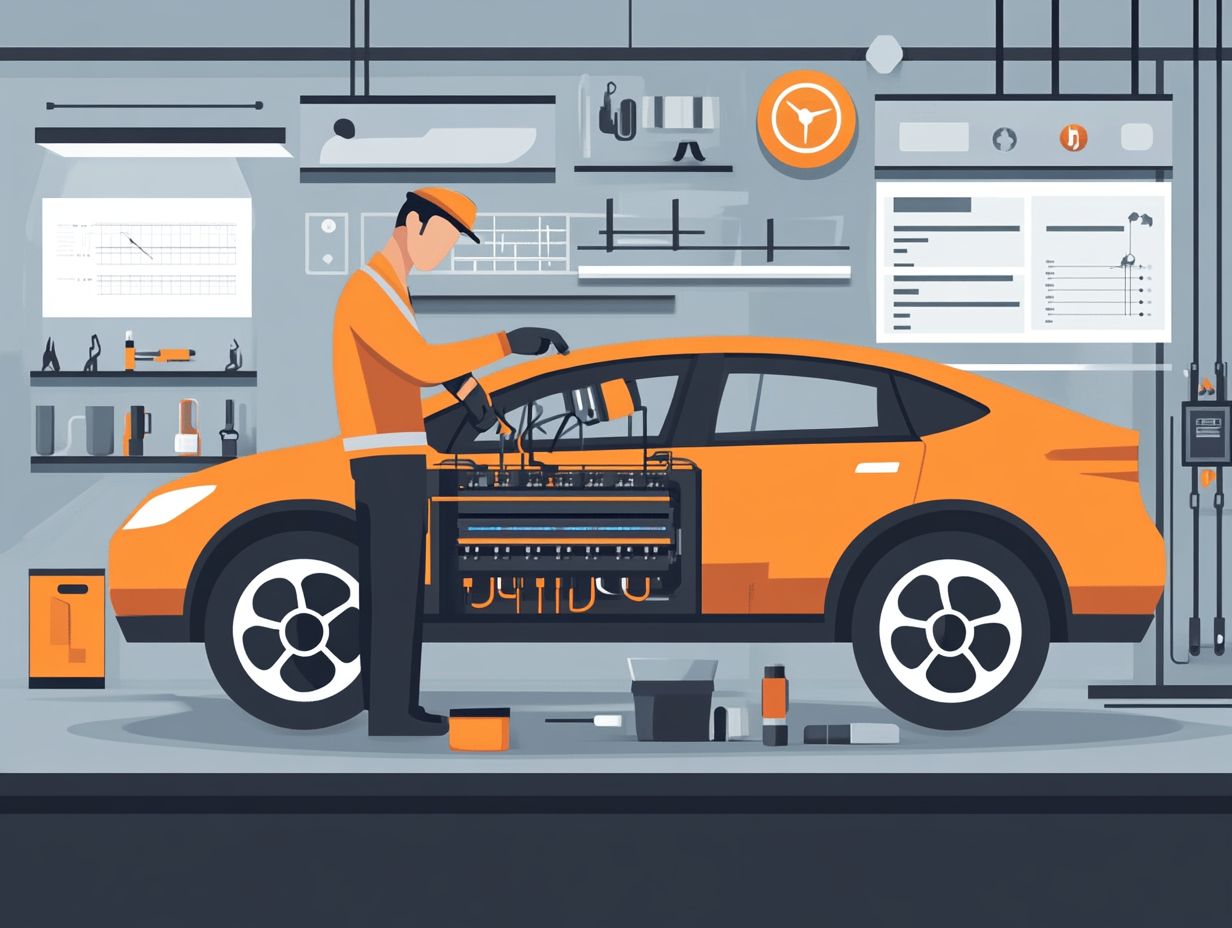
What is an electric vehicle?
An electric vehicle, or EV, is a car that runs on electricity instead of gasoline. They are powered by rechargeable batteries and have an electric motor instead of a traditional internal combustion engine.
What are the main maintenance differences between an electric vehicle and a gas-powered vehicle?
Electric vehicles don’t need oil changes or spark plug replacements. They do, however, need regular checks on tire rotations and brake pads.
How often do electric vehicles need to be serviced?
The frequency of service for an electric vehicle can vary by model and manufacturer. Some models may only need an annual check-up, but don’t delay stay on top of your vehicle’s health!
Are there any special maintenance tasks for electric vehicles?
Electric vehicles have unique maintenance tasks. For beginners, it’s important to check the battery coolant, inspect the charging port, and ensure the electric motor and battery are working properly. You can start with these 5 simple EV maintenance tasks.
Can I do maintenance on my electric vehicle myself?
Some basic maintenance tasks, like checking tire pressure and replacing wiper blades, can be done by the owner. For more complex tasks, it’s best to consult a certified technician trained in electric vehicle maintenance.
How do I find a reliable mechanic for my electric vehicle?
Finding a great mechanic for your EV is crucial! Look for someone certified and experienced in electric vehicle maintenance. You can check with your car dealership or search for certified EV technicians in your area. Asking for recommendations from other electric vehicle owners is also a good idea.

